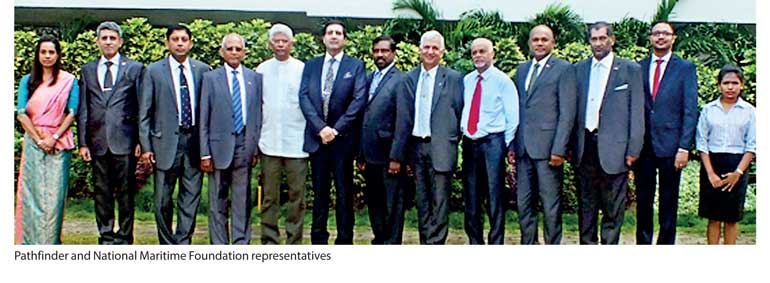Sunday Feb 22, 2026
Sunday Feb 22, 2026
Monday, 19 February 2018 00:00 - - {{hitsCtrl.values.hits}}

 The first bi-lateral conference between the Pathfinder Foundation (PF) and National Maritime Foundation (NMF) focused on developing a platform for analytical and innovative discussion, specifically on Maritime Security and Maritime Domain Awareness covering the Indian Ocean, which would favourably impact countries in the Indian Ocean Region, was held in Colombo last week.
The first bi-lateral conference between the Pathfinder Foundation (PF) and National Maritime Foundation (NMF) focused on developing a platform for analytical and innovative discussion, specifically on Maritime Security and Maritime Domain Awareness covering the Indian Ocean, which would favourably impact countries in the Indian Ocean Region, was held in Colombo last week.
Admiral R.K. Dhowan with Directors of NMF, Admiral Jayanath Colombage, Director, Centre for Indo-Lanka Initiatives at PF with Chairman Bernard Goonetilleke and key resource personalities presented papers of the conference.
The Indian Ocean Region is home to nearly one-third of the world’s population and is of high economic and strategic significance due to its location and traffic that passes through it. It is estimated that nearly half of the world’s containers, one third of bulk cargo traffic and two thirds of oil shipments pass through the Indian Ocean. Also, there is a shift in global economic weight and influence from Atlantic and Pacific oceans to the Indo-Pacific region. The rise of China to number two position and India to number seven position in the world economic order is a clear example of this economic shift.
With a growing population in India and already a large population in China, there will be a requirement to produce and trade more. Therefore, in the 21st century, the Indian Ocean has become the key ocean for energy, trade and food security. This has led to a new interest in the freedom of navigation and overflight in the Indian Ocean. The Indian Ocean is also part of global commons and many major trading nations such as the USA, Japan, China, South Korea, Australia and the Asian countries have shown their interest in this ocean. There are some unstable states in this region, which add to the volatility of strategic maritime security. Also, the presence of non-state actors such as pirates, terrorists, hijackers, IUU fishers, religious extremists, and smugglers of weapons/narcotics/humans, make maritime security a complex and dynamic one.
The Indian subcontinent is in the centre of the most prominent ocean in this century. India with a long coastline, a growing population, fast developing economy and the strongest military power in the IOR, is seen as guarantor of maritime security by many smaller states in the region. India with its ‘look east and neighbourhood first policy’ and the concept of SAGAR (Security And Growth for All in the Region) is keen to ensure security/inviolability of the Indian Ocean.
Sri Lanka, although a small Island state in the southern tip of the Indian sub-continent, is seen as the ‘epicentre’ of the Indian Ocean activities. Due to the geographical proximity of the two countries and their vital locations in the Indian Ocean, it is quite logical that India and Sri Lanka jointly take the leadership in ensuring maritime security. Maritime Domain Awareness (MDA), in which India, Sri Lanka and Maldives are already in agreement to share information on white shipping, can be the area of focus to ensure maritime security in the Indian Ocean.
There is a strong need to monitor the maritime domain with a view to detect and deter prospective threats, which can emanate from states or non-state actors. There may be a requirement to include other states such as Bangladesh, Mauritius and Seychelles in enhancing the MDA concept to cover the wider Indian Ocean.
The rationale to engage in academic discourse on maritime security and MDA in the Indian Ocean was based on the need to develop a policy framework for the attention of policy makers in both the countries. The first bilateral conference between the National Maritime Foundation and Pathfinder Foundation focused on developing a platform for analytical and innovative discussion, focusing specifically on Maritime Security and MDA covering the Indian Ocean, which would favourably impact on the countries in the IOR. The draft of a Code of Conduct for the Indian Ocean was also discussed during this dialogue.
The NMF was represented by its Chairman Admiral R.K. Dhowan, the Director Vice Admiral Pradeep Chauhan, the Executive Director Captain (Dr.) Gurpreet Khurana. The Pathfinder delegation comprised its Chairman Ambassador Bernard Goonetilleke, Senior Fellow Lalith Weeratunga, Admiral Dr. Jayanath Colombage, Luxman Siriwardene and Gayathri Nanayakkara. The special invitees for this event were Admiral Jayanath Perera, General Daya Rathnayake and Major General Milinda Peiris. Barana Waidyatilleke of Lakshman Kadiragarmar Institute contributed with a paper titled ‘a small state’s Quest for Indian Ocean Security: The case of Sri Lanka.